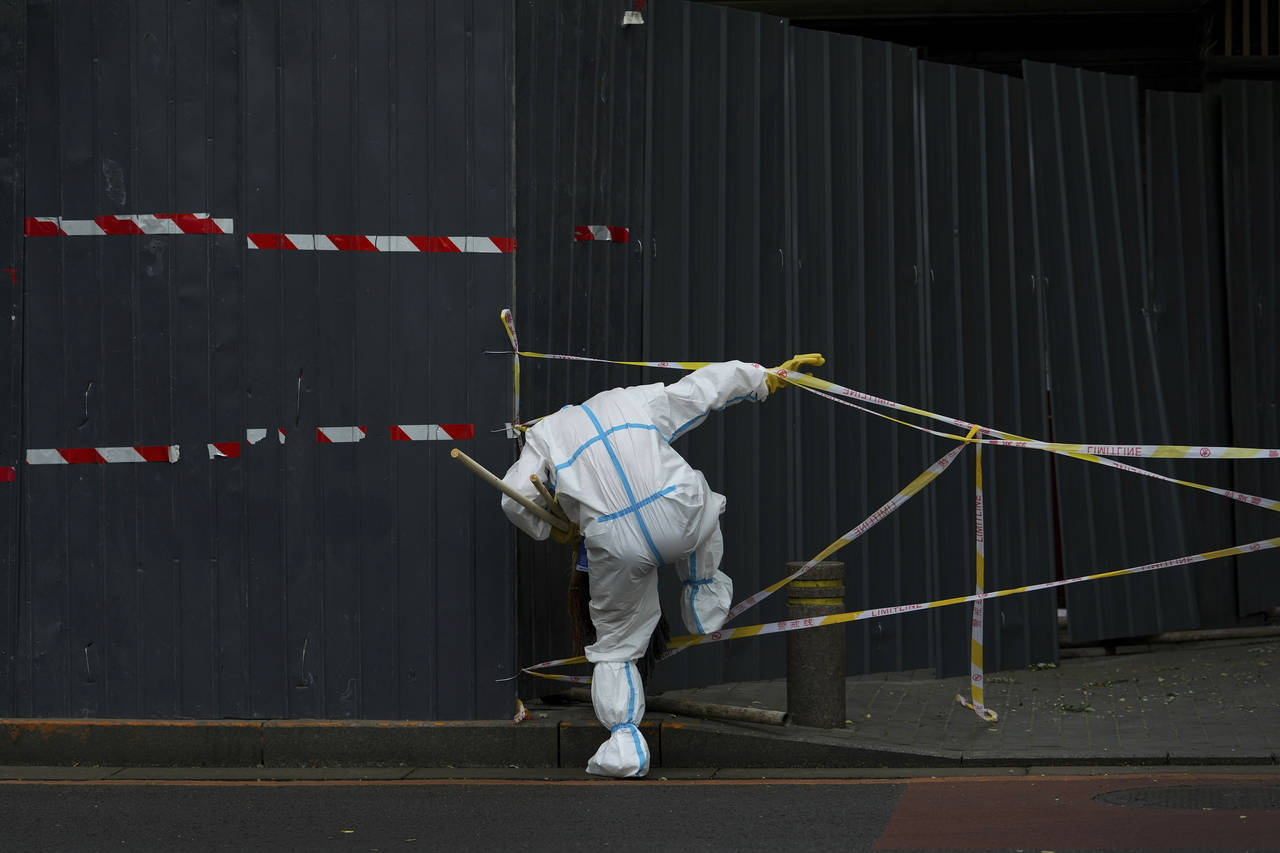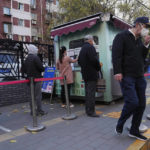EXPLAINER: Why are China’s COVID rules so strict?
Nov 28, 2022, 1:11 PM | Updated: Nov 29, 2022, 5:51 pm

FILE - A worker in protective suit walks through the caution tapes along metal barricades retail shops that has been locked down as part of COVID-19 controls in Beijing, Sunday, June 26, 2022. (AP Photo/Andy Wong, File)
(AP Photo/Andy Wong, File)
BEIJING (AP) — At the outbreak of the COVID-19 pandemic, China set out its “zero-COVID” measures that were harsh, but not out of line with what many other countries were doing to try and contain the virus. While most other nations saw the health and safety regulations as temporary until vaccines were widely available, however, China has stuck steadfastly to its strategy.
Weary of the policy that has confined millions of people to their homes in an attempt to isolate every infection, and with an eye on the freedoms now enjoyed elsewhere around the world, protests have broken out around China in recent days.
Though some anti-virus restrictions have been eased in some places, the ruling Communist Party has affirmed its “zero-COVID” strategy. Here are some of the regulations:
TESTS AND QUARANTINE FOR INBOUND PASSENGERS
Inbound travelers need to take a PCR test before flying and quarantine in a hotel for five days and at home for three days upon arrival. That may seem strict, but prior to updated regulations earlier this month, travelers needed to take two PCR tests before flying and quarantine for seven days in a hotel and three days at home. Before that, the quarantine period was 14 days.
China also ended its “circuit breaker” policy of shutting down a flight for a week or two if a certain percentage of passengers aboard tested positive for COVID-19, with the length of the ban dependent upon how many had the virus.
ISOLATION ON DOMESTIC ROUTES
Travelers on domestic flights, trains or buses who are close contacts of someone with COVID-19 need to quarantine for five days at designated sites, plus three days at home. Prior to November changes, the quarantine time was longer and the close contacts of the person with close contact to someone with COVID-19 also needed to isolate. People who visited areas in China deemed “high-risk” also need to quarantine for seven days at home.
GREEN CODE
Inside China, individuals need to show their personal “green code” — indicating they are COVID-19-negative — when entering public places like shopping malls and restaurants, or when using public transit. Everyone must register with their identification papers, and the code is then displayed through a smartphone app. Staying “green” means not contracting COVID-19, not being a close contact of someone with the virus, and not visiting areas deemed to be a risk. If there is an outbreak in your area, local authorities may require regular testing to keep the code green. In Beijing at the moment, for example, residents must undergo a rapid coronavirus test at least every 48 hours at a government-approved facility.
WHO GOES INTO LOCKDOWN?
China has reacted quickly and decisively to any detection of COVID-19, and has locked down parts of, or entire cities. At the moment the central urban area of Chongqing, with about 10.3 million people, is on lockdown, as is part of Guangzhou.
The decision on what to lock down depends on the scale of the outbreak. Smaller lockdowns of buildings, building compound areas or city districts are common. Entire apartment building units are locked down if a single resident is found to have COVID-19, and people are not allowed to leave for at least five days. Food and other essential supplies can be ordered for delivery.
Similarly, office buildings are locked down if someone in the building tests positive for COVID-19 until the building can be disinfected, a process that usually takes several days.
OTHER RESTRICTIONS
China has in place many other regulations that would be familiar to most from the early months of the pandemic. Social distancing is encouraged, and people have to wear masks in public venues. In areas where there is believed to be a risk of transmission, there are restrictions on large gatherings, restaurants are closed for indoor dining, and enhanced disinfection measures are required at public venues.
Much like the bubble measures imposed for the 2022 Winter Olympics in Beijing, facilities where people are deemed most at risk, like nursing homes, have “closed-loop management” plans in place, under which workers live in their workplaces with no outside contacts.
___
AP news researchers Caroline Chen and Yu Bing contributed to this report.
Copyright © The Associated Press. All rights reserved. This material may not be published, broadcast, rewritten or redistributed.




















